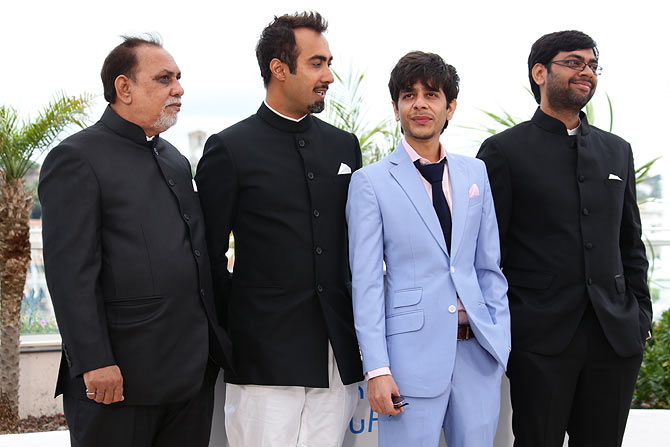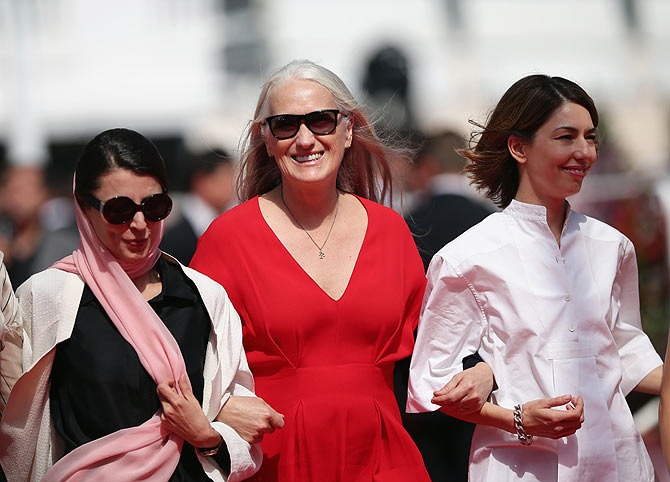 | « Back to article | Print this article |
Titli flies in Cannes!
The first screening for Hindi film draws prolonged applause at the Cannes film festival.
Director Kanu Behl is in Un Certain Regard at Cannes, no mean feat at the world’s top film festival. To do it with a first feature is real achievement.
At the final fade-out, the applause for his film Titli was heartwarming.
Most of us believe deep down that ‘nobody really understands us’ in other countries.
But many, it seems, do -- especially when the basic content of the tale is pretty much universal: nice boy gets dragged into bad ways, nice girl arrives, boy redeems himself.
The art lies in the telling.
And Kanu Behl may have edged into position to be considered for the Camera d’Or, the award for best film in the main competition, Un Certain Regard, Directors’ Fortnight and Critic’s Week.
It all happens in one of those near-slum environs of Delhi.
Titli (his mother had wanted a girl and he was born) is the youngest of a brutal car-jacking brotherhood. He yearns to escape the criminality and sleaze around him.
To keep him in control, his family marries him off to a slightly higher class girl and there he finds an ally.
With her money he comes close to breaking free: buying his ambition, a parking lot.
But at the point of a gun, he calls off the scheme and goes back to his wife.
Kanu Behl discards Bollywoodisms, pursues and succeeds with what he calls ‘captured moments,’ an engaging, wholly naturalistic style of performance. He is a devotee of Stanley Kubrick behind whose films, says Behl, ‘there is no filmmaker to be found.’
Titli is made under the Yash Raj Films banner. It is produced by Dipakar Banerjee, who was given the option by YRF of making three films of his choice. Titli is the first.
Please click Next to see more.
'Satyajit Ray influenced us all and still does'
Jane Campion is a lady of many laurels -- winner of the Palme d’Or a decade ago, director of Holly Hunter’s Oscar-winning performance in The Piano and now returning as jury president, adjudging the main competition at Le Festival de Cannes.
She is the only woman to have won the top award in 67 years of Cannes fests and is known to have clear views on what she calls the ‘inherent sexism’ in the film business.
At the opening press conference of the jury, she started applause laced with an uneasy chuckle when she turned to the gentlemen on her jury saying with a grin, “You guys are eating all the cake.”
She took time off her tight schedule of screenings for a chat in a quiet corner of the tumultuous Palais. “Cannes is exciting and the festival fare provokes and inspires. Seven or eight percent of the 1,800 submissions we received were from women, as much as 20 per cent of the films accepted were by women.”
Campion has warm links with India that go back a decade to the time she made Holy Smoke, shot in Pushkar.
An Australian girl comes to India and gets involved more than spiritually with a guru. Her family contract a specialist in ‘de-toxing’ such adherents. He, in turn, falls in love with the lady. The film was a moderate artistic and commercial success.
Her associations with India are deeper and go back further than Pushkar incense.
“Satyajit Ray,” she says, “influenced us all and still does. You trust his work. When I open my heart to something, he’s there somehow.”
She does not see much Indian cinema but she has a view about it. “It’s very specific, it belongs in India, in its culture, present and traditional. I don’t know that it travels well.”
Campion believes that Indian filmmakers need to be “churned up a bit, they need to get more ambitious. Everybody is super bright in India. There are bound to be a lot of them in Indian cinema.”
Campion is not where she was with The Piano, not with Holy Smoke and not with The Cut, an erotic saga with Meg Ryan of a girl trying to trace a killer who comes after her. Top of the Lake, a TV crime series (six episodes), “has been a refresher for my career,” she says. It won a Golden Globe last year for the protagonist.

